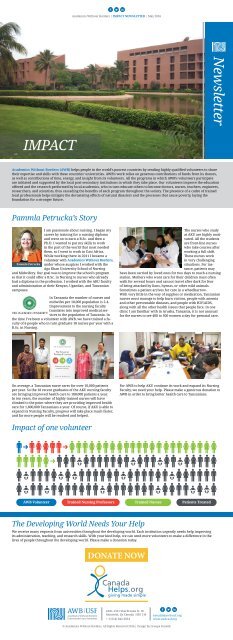May Impact Newsletter—AWB
Academics Without Borders is a non-profit organization that sends academics and professors from Canada and the United States to universities in developing countries. There our volunteer academics work with the host universities to set up new education programs in areas like medicine, nursing, engineering and more. Improving post-secondary education has a lasting positive impact on developing communities and countries.
Academics Without Borders is a non-profit organization that sends academics and professors from Canada and the United States to universities in developing countries. There our volunteer academics work with the host universities to set up new education programs in areas like medicine, nursing, engineering and more. Improving post-secondary education has a lasting positive impact on developing communities and countries.
- No tags were found...
You also want an ePaper? Increase the reach of your titles
YUMPU automatically turns print PDFs into web optimized ePapers that Google loves.
Academics Without Borders | IMPACT NEWSLETTER | <strong>May</strong> 2016<br />
Newsletter<br />
IMPACT<br />
Academics Without Borders (AWB) helps people in the world’s poorest countries by sending highly qualified volunteers to share<br />
their expertise and skills with these countries’ universities. AWB’s work relies on generous contributions of funds from its donors,<br />
as well as contributions of time, energy, and insight from its volunteers. All the programs in which AWB’s volunteers participate<br />
are initiated and supported by the local post-secondary institutions in which they take place. Our volunteers improve the education<br />
offered and the research performed by local academics, who in turn educate others to become doctors, nurses, teachers, engineers,<br />
researchers, and scientists, thus cascading the benefits of each program throughout the society. The presence of a cadre of trained<br />
local professionals helps mitigate the devastating effects of natural disasters and the processes that cause poverty, laying the<br />
foundation for a stronger future.<br />
Pammla Petrucka’s Story<br />
I am passionate about nursing. I began my<br />
career by training for a nursing diploma<br />
and went on to earn a B.Sc. and then a<br />
Ph.D. I wanted to put my skills to work<br />
in the part of the world that most needed<br />
them, so I went to work in East Africa.<br />
While working there in 2011 I became a<br />
volunteer with Academics Without Borders,<br />
Pammla Petrucka under whose auspices I worked with the<br />
Aga Khan University School of Nursing<br />
and Midwifery. Our goal was to improve the school’s program<br />
so that it could offer a B.Sc. in Nursing to nurses who already<br />
had a diploma in the profession. I worked with the AKU faculty<br />
and administration at their Kenyan, Ugandan, and Tanzanian<br />
campuses.<br />
In Tanzania the number of nurses and<br />
midwifes per 10,000 population is 2.4.<br />
Improvement to the nursing faculty<br />
translates into improved medical services<br />
to the population of Tanzania. In<br />
the time I’ve been a volunteer with AWB, we have trained a faculty<br />
of 6 people who in turn graduate 18 nurses per year with a<br />
B.Sc. in Nursing.<br />
The nurses who study<br />
at AKU are highly motivated.<br />
All the students<br />
are front-line nurses<br />
who take courses after<br />
working a full shift.<br />
These nurses work<br />
in very challenging<br />
situations. For instance,<br />
patients may<br />
have been carried by loved ones for two days to reach a nursing<br />
station. Mothers who want care for their children must often<br />
walk for several hours and cannot travel after dark for fear<br />
of being attacked by lions, hyenas, or other wild animals.<br />
Sometimes a patient arrives for care in a wheelbarrow.<br />
With very little in the way of supplies or medication, Tanzanian<br />
nurses must manage to help burn victims, people with anemia<br />
and other preventable diseases, and people with HIV/AIDS,<br />
along with all the other health issues that people face. In one<br />
clinic I am familiar with in Arusha, Tanzania, it is not unusual<br />
for the nurses to see 400 to 500 women a day for prenatal care.<br />
On average, a Tanzanian nurse cares for over 10,000 patients<br />
per year. So the 18 recent graduates of the AKU nursing faculty<br />
are bringing improved health care to 180,000 patients a year.<br />
In ten years, the number of highly trained nurses will have<br />
climbed to the point where they are providing improved health<br />
care for 1,800,000 Tanzanians a year. Of course, if AKU is able to<br />
expand its Nursing Faculty, progress will take place much faster,<br />
and far more people will be reached and helped.<br />
For AWB to help AKU continue its work and expand its Nursing<br />
Faculty, we need your help. Please make a generous donation to<br />
AWB in order to bring better health care to Tanzanians.<br />
<strong>Impact</strong> of one volunteer<br />
AWB Volunteer Trained Nursing Professors Trained Nurses<br />
Patients Treated<br />
The Developing World Needs Your Help<br />
We receive many requests from universities throughout the developing world. Each institution urgently needs help improving<br />
its administration, teaching, and research skills. With your kind help, we can send more volunteers to make a difference in the<br />
lives of people throughout the developing world. Please make a donation today.<br />
DONATE NOW<br />
#A91-1321 Sherbrooke St. W.<br />
Montréal, Qc Canada H3G 1J4<br />
+ 1 (514) 842-3034<br />
execdir@awb-usf.org<br />
www.awb-usf.org<br />
© Academics Without Borders, All Rights Reserved 2016 | Design by Groupe Fanatik


